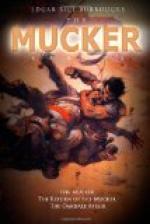An hour later Barbara was strolling up and down before the ranchhouse in the cool and refreshing air of the Chihuahua night. Her mind was occupied with disquieting reflections of the past few hours. Her pride was immeasurably hurt by the part impulse had forced her to take in the affair at the office. Not that she regretted that she had connived in the escape of Bridge; but it was humiliating that a girl of her position should have been compelled to play so melodramatic a part before Grayson and his Mexican vaqueros.
Then, too, was she disappointed in Bridge. She had looked upon him as a gentleman whom misfortune and wanderlust had reduced to the lowest stratum of society. Now she feared that he belonged to that substratum which lies below the lowest which society recognizes as a part of itself, and which is composed solely of the criminal class.
It was hard for Barbara to realize that she had associated with a thief—just for a moment it was hard, until recollection forced upon her the unwelcome fact of the status of another whom she had known—to whom she had given her love. The girl did not wince at the thought—instead she squared her shoulders and raised her chin.
“I am proud of him, whatever he may have been,” she murmured; but she was not thinking of the new bookkeeper. When she did think again of Bridge it was to be glad that he had escaped—“for he is an American, like myself.”
“Well!” exclaimed a voice behind her. “You played us a pretty trick, Miss Barbara.”
The girl turned to see Grayson approaching. To her surprise he seemed to hold no resentment whatsoever. She greeted him courteously.
“I couldn’t let you turn an American over to General Villa,” she said, “no matter what he had done.”
“I liked your spirit,” said the man. “You’re the kind o’ girl I ben lookin’ fer all my life—one with nerve an’ grit, an’ you got ’em both. You liked thet bookkeepin’ critter, an’ he wasn’t half a man. I like you an’ I am a man, ef I do say so myself.”
The girl drew back in astonishment.
“Mr. Grayson!” she exclaimed. “You are forgetting yourself.”
“No I ain’t,” he cried hoarsely. “I love you an’ I’m goin’ to have you. You’d love me too ef you knew me better.”
He took a step forward and grasped her arm, trying to draw her to him. The girl pushed him away with one hand, and with the other struck him across the face.
Grayson dropped her arm, and as he did so she drew herself to her full height and looked him straight in the eyes.
“You may go now,” she said, her voice like ice. “I shall never speak of this to anyone—provided you never attempt to repeat it.”
The man made no reply. The blow in the face had cooled his ardor temporarily, but had it not also served another purpose?—to crystallize it into a firm and inexorable resolve.
When he had departed Barbara turned and entered the house.




